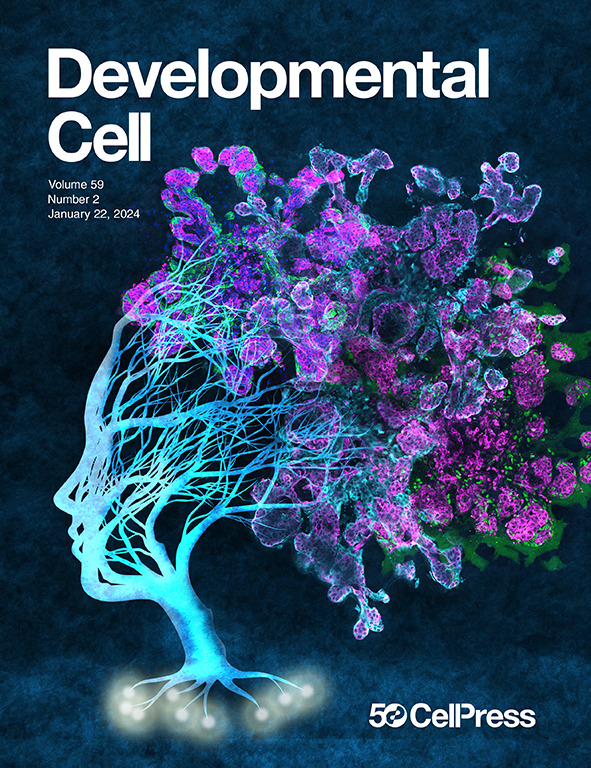H2A的动态控制。Zub和H3K27me3在拟南芥细胞命运决定中的作用
IF 8.7
1区 生物学
Q1 CELL BIOLOGY
引用次数: 0
摘要
环境温度对植物发育至关重要,它触发了复杂的机制,使植物能够对温度变化做出适应性反应。染色质修饰在不同温度下形成细胞发育命运的精确协调仍然是难以捉摸的。我们的研究综合了转录组、表观基因组分析和遗传学,表明较低的环境温度(16°C)通过特异性沉积H2A,部分恢复了prc2突变体中H3K27me3缺失引起的发育缺陷。Zub在拟南芥中异位表达ABA不敏感基因3 (ABI3)和叶子叶don 1 (LEC1)等胚胎基因。这种沉积导致这些基因的下调,并补偿H3K27me3的耗竭。polycomb - repression complex 1 (PRC1)催化H2A。Zub和prc2催化的H3K27me3在沉默胚胎基因转录以促进萌发后发育中发挥作用。低温诱导TOE1蛋白水平的降低减慢了H2A。特定位点的Z转换,维持胚胎基因的抑制,减轻萌发后阶段对PRC2-H3K27me3的需求。我们的发现提供了合作表观遗传层的机制见解,促进植物适应不同的环境温度。本文章由计算机程序翻译,如有差异,请以英文原文为准。

Dynamic control of H2A.Zub and H3K27me3 by ambient temperature during cell fate determination in Arabidopsis
Crucial to plant development, ambient temperature triggers intricate mechanisms enabling adaptive responses to temperature variations. The precise coordination of chromatin modifications in shaping cell developmental fate under diverse temperatures remains elusive. Our study, integrating comprehensive transcriptome, epigenome profiling, and genetics, demonstrates that lower ambient temperature (16°C) partially restores developmental defects caused by H3K27me3 loss in prc2 mutants by specifically depositing H2A.Zub at ectopically expressed embryonic genes in Arabidopsis, such as ABA INSENSITIVE 3 (ABI3) and LEAFY COTYLEDON 1 (LEC1). This deposition leads to downregulation of these genes and compensates for H3K27me3 depletion. Polycomb-repressive complex 1 (PRC1)-catalyzed H2A.Zub and PRC2-catalyzed H3K27me3 play roles in silencing transcription of embryonic genes for post-germination development. Low-temperature-induced reduction of TOE1 protein level decelerates H2A.Z turnover at specific loci, sustaining repression of embryonic genes and alleviating requirement for PRC2-H3K27me3 at post-germination stage. Our findings offer mechanistic insights into the cooperative epigenetic layers, facilitating plant adaptation to varying environmental temperatures.
求助全文
通过发布文献求助,成功后即可免费获取论文全文。
去求助
来源期刊

Developmental cell
生物-发育生物学
CiteScore
18.90
自引率
1.70%
发文量
203
审稿时长
3-6 weeks
期刊介绍:
Developmental Cell, established in 2001, is a comprehensive journal that explores a wide range of topics in cell and developmental biology. Our publication encompasses work across various disciplines within biology, with a particular emphasis on investigating the intersections between cell biology, developmental biology, and other related fields. Our primary objective is to present research conducted through a cell biological perspective, addressing the essential mechanisms governing cell function, cellular interactions, and responses to the environment. Moreover, we focus on understanding the collective behavior of cells, culminating in the formation of tissues, organs, and whole organisms, while also investigating the consequences of any malfunctions in these intricate processes.
 求助内容:
求助内容: 应助结果提醒方式:
应助结果提醒方式:


